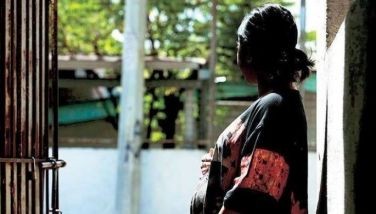Alyansa hopes Texas docs will reverse Roco prognosis
April 19, 2004 | 12:00am
Members of the Alyansa ng Pag-asa are hopeful that Texas doctors will reverse the diagnosis of prostate cancer for their standard-bearer Raul Roco on the premise that the initial finding is a "false positive."
But should Texas doctors validate the preliminary findings by Filipino physicians, Alyansa campaign manager Dr. Jaime Galvez-Tan said yesterday that it should not become a hindrance to Roco’s presidential bid because prostate cancer is not as devastating as other forms of cancer.
"Initial medical findings are not always 100 percent accurate. There is always (room for) false positive results," he told The STAR.
Galvez-Tan explained that medical results are usually dependent on certain factors such as laboratory capability, the kind of test procedures applied and the quality of reagents and equipment used. If these requirements are not sufficiently met, the results may be inaccurate, he said.
"You do not always get the real results during the initial examinations so you clamor for confirmation," he said.
Roco is undergoing further tests in a hospital just outside Houston, Texas to validate the findings of Filipino doctors that his prostate cancer, first detected in 1996, has recurred.
In a radio interview last Saturday, Roco said that while the medical procedures he is undergoing are not yet complete, Texas doctors have already given him "good prognosis."
He assured his supporters that he will pursue his presidential bid as long as his health permits him to do so. He is expected to come home before the month ends.
Galvez-Tan pointed out that prostate cancer is not a death sentence compared to other forms of cancer. He claimed that even the treatment for this illness does not weaken patients so much, enabling them to play tennis shortly after every session.
He said that aside from surgery, treatment for prostate cancer usually includes radiation and hormone therapy. There is no need for chemotherapy, which is accompanied by nausea and body weakening.
"Those who have prostate cancer can live a normal and active life. It should not be a major concern here," Galvez-Tan added.
He cited two American politicians who survived their bout with prostate cancer — Democrat John Kerry, a rival of American president George W. Bush for the presidency this year, and former New York mayor Rudolph Guiliani.
A cancer expert from the Philippine Cancer Society (PCS) earlier said prostate cancer is "compatible with life," and one can still be "a good president" even if one is diagnosed with it.
"Those who have this can still have a long life. They can live up to 10 to 20 years, almost without symptoms," said PCS oncologist Kelly Salvador.
Galvez-Tan admitted that the enemy of the Alyansa now is not cancer but the Filipino people’s perception that cancer is fatal and debilitating.
He could not ascertain what kind of medical examinations Roco underwent in the Philippines but claimed the most common tests for prostate cancer include the prostate-specific antigen (PSA) test and digital rectal examination (DRE).
"Certain prostate conditions, including prostate cancer, can cause high levels of PSA in the blood," according to the website of the American Foundation for Urologic Diseases.
The website explained that PSA is made only by prostate cells and "small amounts of the protein get into the circulation and can be measured in the blood."
The University of Pittsburgh Medical Center’s website said that "during DRE, a doctor inserts a lubricated, gloved finger into the patient’s rectum to feel for lumps, enlargements, or areas of hardness that might indicate prostate cancer."
Doctors also take a patient’s medical history into consideration when they are examining for the presence of cancer. In Roco’s case, he had prostate cancer in 1996 but underwent surgery that removed the cancer cells from his prostate.
"That’s only the first level. I think there are many other confirmatory tests that a patient needs to undergo to say that it’s really cancer," Galvez-Tan said.
As this developed, Malacañang refused to comment on Roco’s admission that he will withdraw from the presidential race if his health fails. However, he feels he can go on with his candidacy.
"We won’t enter into any speculations on this matter," Presidential Spokesman Ignacio Bunye said in a radio interview.
He said if Roco cannot push through with his presidential bid for health reasons, his supporters know what is best for them.
"Maybe they are now thinking whom they will choose. We leave it to them. They know what will be best for our country," Bunye said.
Bunye said President Arroyo talked with Roco on the phone before he left for the United States early last week, but only to express concern for his health and wish him a speedy recovery.
He said he does not know if the two presidential bets spoke to each other after the phone call.
Immediately after Roco announced his plan to go to the United States for treatment for chronic pain in the lower back, rumors flew that Roco had entered into a deal with the administration to pull out of the race. Roco has denied the rumor.
His illness is expected to jeopardize his presidential bid, especially as he has been running third in major election surveys and had to go on medical leave to the US in the middle of the campaign. — With Marvin Sy
But should Texas doctors validate the preliminary findings by Filipino physicians, Alyansa campaign manager Dr. Jaime Galvez-Tan said yesterday that it should not become a hindrance to Roco’s presidential bid because prostate cancer is not as devastating as other forms of cancer.
"Initial medical findings are not always 100 percent accurate. There is always (room for) false positive results," he told The STAR.
Galvez-Tan explained that medical results are usually dependent on certain factors such as laboratory capability, the kind of test procedures applied and the quality of reagents and equipment used. If these requirements are not sufficiently met, the results may be inaccurate, he said.
"You do not always get the real results during the initial examinations so you clamor for confirmation," he said.
Roco is undergoing further tests in a hospital just outside Houston, Texas to validate the findings of Filipino doctors that his prostate cancer, first detected in 1996, has recurred.
In a radio interview last Saturday, Roco said that while the medical procedures he is undergoing are not yet complete, Texas doctors have already given him "good prognosis."
He assured his supporters that he will pursue his presidential bid as long as his health permits him to do so. He is expected to come home before the month ends.
Galvez-Tan pointed out that prostate cancer is not a death sentence compared to other forms of cancer. He claimed that even the treatment for this illness does not weaken patients so much, enabling them to play tennis shortly after every session.
He said that aside from surgery, treatment for prostate cancer usually includes radiation and hormone therapy. There is no need for chemotherapy, which is accompanied by nausea and body weakening.
"Those who have prostate cancer can live a normal and active life. It should not be a major concern here," Galvez-Tan added.
He cited two American politicians who survived their bout with prostate cancer — Democrat John Kerry, a rival of American president George W. Bush for the presidency this year, and former New York mayor Rudolph Guiliani.
A cancer expert from the Philippine Cancer Society (PCS) earlier said prostate cancer is "compatible with life," and one can still be "a good president" even if one is diagnosed with it.
"Those who have this can still have a long life. They can live up to 10 to 20 years, almost without symptoms," said PCS oncologist Kelly Salvador.
Galvez-Tan admitted that the enemy of the Alyansa now is not cancer but the Filipino people’s perception that cancer is fatal and debilitating.
He could not ascertain what kind of medical examinations Roco underwent in the Philippines but claimed the most common tests for prostate cancer include the prostate-specific antigen (PSA) test and digital rectal examination (DRE).
"Certain prostate conditions, including prostate cancer, can cause high levels of PSA in the blood," according to the website of the American Foundation for Urologic Diseases.
The website explained that PSA is made only by prostate cells and "small amounts of the protein get into the circulation and can be measured in the blood."
The University of Pittsburgh Medical Center’s website said that "during DRE, a doctor inserts a lubricated, gloved finger into the patient’s rectum to feel for lumps, enlargements, or areas of hardness that might indicate prostate cancer."
Doctors also take a patient’s medical history into consideration when they are examining for the presence of cancer. In Roco’s case, he had prostate cancer in 1996 but underwent surgery that removed the cancer cells from his prostate.
"That’s only the first level. I think there are many other confirmatory tests that a patient needs to undergo to say that it’s really cancer," Galvez-Tan said.
As this developed, Malacañang refused to comment on Roco’s admission that he will withdraw from the presidential race if his health fails. However, he feels he can go on with his candidacy.
"We won’t enter into any speculations on this matter," Presidential Spokesman Ignacio Bunye said in a radio interview.
He said if Roco cannot push through with his presidential bid for health reasons, his supporters know what is best for them.
"Maybe they are now thinking whom they will choose. We leave it to them. They know what will be best for our country," Bunye said.
Bunye said President Arroyo talked with Roco on the phone before he left for the United States early last week, but only to express concern for his health and wish him a speedy recovery.
He said he does not know if the two presidential bets spoke to each other after the phone call.
Immediately after Roco announced his plan to go to the United States for treatment for chronic pain in the lower back, rumors flew that Roco had entered into a deal with the administration to pull out of the race. Roco has denied the rumor.
His illness is expected to jeopardize his presidential bid, especially as he has been running third in major election surveys and had to go on medical leave to the US in the middle of the campaign. — With Marvin Sy
BrandSpace Articles
<
>
- Latest
- Trending
Trending
Latest
Trending
Latest
Recommended




























